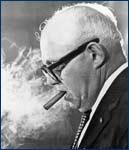 George Meany was the builder of the modern AFL-CIO. He was born into an Irish Catholic family in New York City and spent most of his boyhood in the Bronx. His father, Michael Meany, was president of the Bronx local of the United Association of Plumbers and Pipe Fitters and in 1910, Meany joined the union as an apprentice at the age of 16, working as a plumber in New York for the next decade.
George Meany was the builder of the modern AFL-CIO. He was born into an Irish Catholic family in New York City and spent most of his boyhood in the Bronx. His father, Michael Meany, was president of the Bronx local of the United Association of Plumbers and Pipe Fitters and in 1910, Meany joined the union as an apprentice at the age of 16, working as a plumber in New York for the next decade.
In 1920, Meany was elected as the youngest member of the local union's executive board and two years later became a full-time business agent. During the 1920s, Meany was active on behalf of his local in both the New York City Central Labor Council and the New York State Federation of Labor, where he ran successfully for president in 1934.
As head of the New York state labor movement, Meany built a powerful political organization, passing one of the nation's first unemployment insurance laws and forging support for the reelection of President Franklin Roosevelt in 1936. Meany also led a successful strike for fair wages of craftsmen working on the public works projects of the New Deal.
Meany was elected secretary-treasurer of the national American Federation of Labor (AFL) in 1939. As second in command to President William Green, Meany played an important role in the formation of the War Labor Board, which helped spur the growth of union membership during the second world war. Meany took responsibility for the federation's international activities. While still in New York, working with the Jewish Labor Committee, he had actively supported German trade unionists fleeing the Nazis. He insisted on the inclusion of workers' rights in the postwar Marshall Plan. His leadership led to the creation of the International Confederation of Free Trade Unions at the end of the war, and he fought for free trade unions around the world for all of his career.
When a hostile Congress passed the repressive Taft-Hartley Act in 1947, Meany established and led Labor's League for Political Education, the first full-scale federation effort to register, educate and mobilize union members. Labor's strength helped elect Harry Truman as president in 1948.Meany was elected to the presidency of the AFL in 1952 on the death of William Green. He assumed the leadership of a divided labor movement. Many of the nation's industrial unions were part of the Congress of Industrial Organizations (CIO), which had been created in the 1930s. He immediately sought to unify the movement, an effort that culminated in the founding convention of the AFL-CIO in 1955. Meany was elected unanimously as the first president of the merged labor federation.
Meany modernized and expanded the national AFL-CIO, making the organization a powerful voice in the nation's political and legislative arena. Under his leadership, the American labor movement won unprecedented gains for ordinary working Americans, especially during the Kennedy and Johnson administrations. Meany, a staunch supporter of civil and equal rights his entire career, put the federation's muscle behind the civil rights movement, insisting that the historic 1964 Civil Rights Act call for an end to both workplace and community discrimination. The AFL-CIO was also the center of support for important social programs such as Medicare. His presidency also saw the creation of important new programs such as the Labor Studies Center, constituency organizations for women, minorities and retirees and training programs for minorities. Meany fully supported the organizing of the fledgling United Farm Workers union.
Meany viewed the labor movement as more than a "special interest" it was rather the only organization in American life that spoke for the common citizen. He termed it the "people's lobby." He believed strongly that free trade unions were an essential part of a democratic society—and he fought against both political extremists and corrupt influences. During the 25 years he led the merged AFL-CIO, he was the nation's strongest voice for human and civil rights, in America and around the world, speaking out against colonial exploitation of the developing world, supporting the state of Israel, fighting for the freedom of the states of Central Europe, advocating for Soviet Jews and supporting the fights against South African apartheid and against the military dictatorships in Spain and Chile.
As much as he valued the labor movement, George Meany valued his family and his church—he and his wife of more than 60 years, the former Eugenia McMahon, had three daughters, Regina, Eileen and Genevieve. In 1979, Meany stepped down as the president of the AFL-CIO and turned over its leadership to his second in command, Lane Kirkland. He died in 1980.

